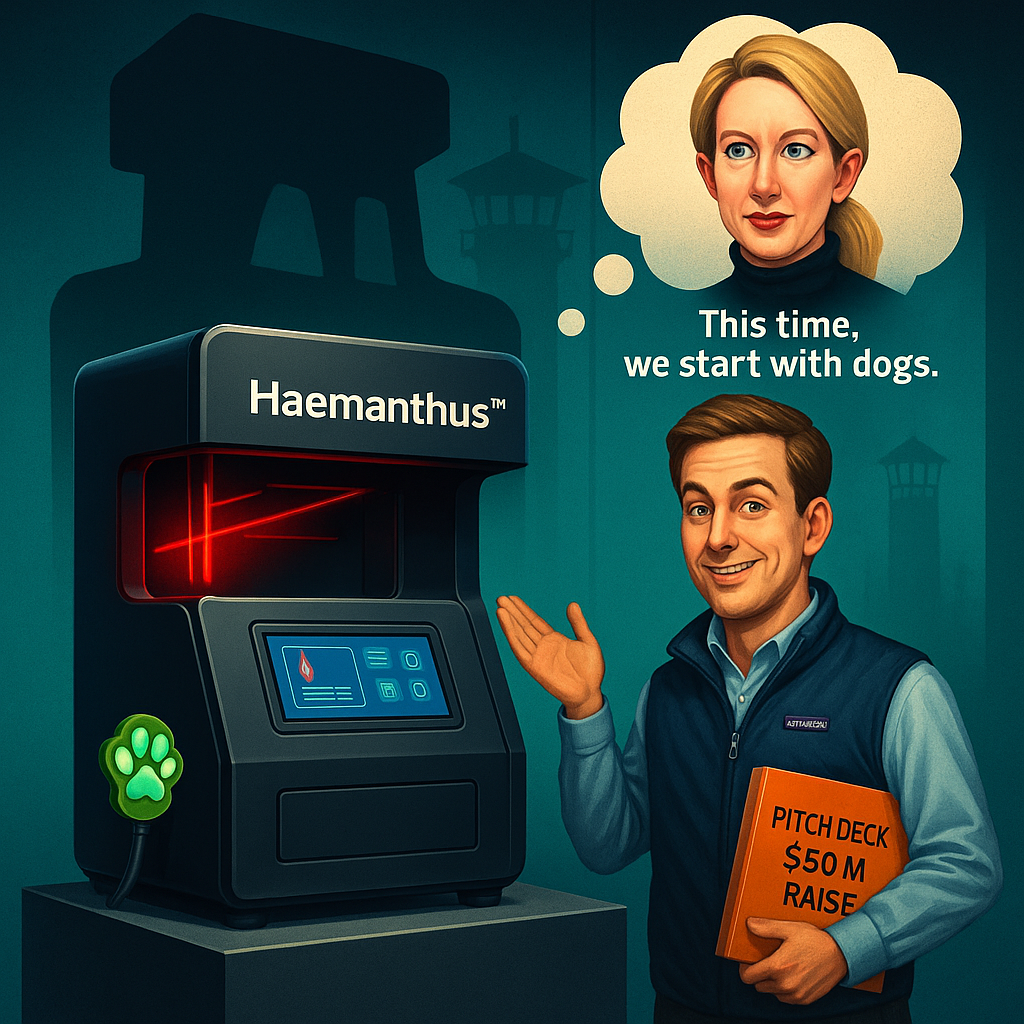Theranos, But Make It Wag: The Sequel Nobody Asked For
According to reporting by The New York Times, Haemanthus is developing a suspiciously Theranos-esque machine: a slick black box with lasers, a screen, and — wait for it — zero regulatory oversight.

Silicon Valley has always had a soft spot for comebacks. But this one? This one belongs in a case study — preferably after being scanned by a laser-equipped, urine-sniffing diagnostic cube built by the boyfriend of America’s favorite fraudster.
That’s right: Billy Evans — heir to a California hotel fortune, partner to incarcerated Theranos founder Elizabeth Holmes, and apparent sufferer of severe irony deficiency — is now raising $50 million for Haemanthus, a diagnostics startup whose name is literally a synonym for “blood.” Subtle. Very subtle. It’s the kind of naming choice that screams, “No lessons learned, full speed ahead.”
And if you’re wondering whether this Silicon Valley sequel sounds suspiciously familiar, that’s because it is.
Theranos 2.0 — But Make It Dogs
According to reporting by The New York Times’ Rob Copeland, Haemanthus is developing a slick black box for diagnostics: lasers, touchscreen, futuristic design… and — wait for it — absolutely zero regulatory oversight. Not our words, theirs. The USDA reportedly “confirmed in writing” that it has no jurisdiction over the company’s prototype.
That’s one way to avoid government interference: build a startup in a market where nobody’s watching. Enter: pet diagnostics. Because if you’re going to reboot the most infamous fraud in biotech history, best to start by gaslighting golden retrievers instead of humans. Who’s going to complain, the Labradoodle?
The pitch deck leans heavily on the idea of scanning pet urine and blood samples for early health indicators. But the long-term vision, unsurprisingly, is to move back into the human market. Step one: trick dogs. Step two: win back Silicon Valley’s most gullible investors.
Billy Evans, the “Stealth” Founder
Billy Evans describes himself on LinkedIn as working at a “stealth startup.” Translation: “Please don’t Google my last name.” Investor materials for Haemanthus, shockingly, omit any mention of his direct connection to Elizabeth Holmes — you know, the woman who gave us fake test results, failed diagnoses, and a hit streaming series.
But don’t worry, this time it’s different. This time, the lasers are “tunable.” Because nothing says “scientific credibility” like sprinkling in a new adjective to describe the same black box Theranos was selling a decade ago.
The investor presentation reportedly promises a future where Haemanthus builds a stamp-sized wearable capable of detecting infections, hormone changes, and even cancer with just a wave of a wand and the press of a touchscreen. No need for clinical trials, peer-reviewed research, or — God forbid — scientific validation. Just vibes, venture capital, and a lot of misplaced optimism.
Some Investors Actually Said “No”
To be fair, not everyone in Silicon Valley is buying what Billy’s selling. VC James Breyer, who already dodged the Theranos bullet twice, passed on Haemanthus, citing something radical called “scientific defensibility.” Others, including Michael Dell’s investment firm, also took a hard pass.
But somewhere out there, someone with a crypto wallet, a Labradoodle, and a trust fund is probably writing a check. Because in the Valley, no idea is too absurd as long as the founder says “AI” or “laser” enough times per slide.
The Irony Is Almost Too Much
The Haemanthus origin story feels less like cutting-edge biotech and more like an SNL sketch rejected for being too obvious. Imagine: the spiritual sequel to The Dropout, except the lead isn’t in a black turtleneck whispering about “changing the world.” He’s in a Patagonia vest, holding a PowerPoint that basically says: “This time, we’ll start with dogs.”
The irony is suffocating. A convicted fraudster’s partner raising millions for a suspiciously similar diagnostic machine — with the same secrecy, the same over-promises, and the same glaring lack of oversight. The only new ingredient is “pets,” which somehow makes it even darker.
Silicon Valley’s Redemption Fetish
Silicon Valley loves a redemption arc. Founders flame out, burn investor cash, humiliate themselves on the cover of Forbes, and then — give it a year or two — they’re back with a fresh buzzword and a new cap table.
But maybe, just maybe, we should draw the line at blood-testing startups run by the romantic partners of convicted fraudsters. The same community that swore it had learned from the Theranos debacle is now flirting with Theranos Lite: same concept, shinier slide deck, fewer regulators.
Then again, this is the Valley — where the only thing more consistent than self-delusion is the belief that this time, with enough lasers and slightly fewer acronyms, it’ll work.
Spoiler: it won’t.
The Bottom Line: Lessons Not Learned
The Haemanthus saga is less about animal health and more about Silicon Valley’s goldfish-like memory. The idea that investors would even consider funding a company so directly tethered to Elizabeth Holmes’ orbit is a sign that the culture of hype still trumps due diligence.
Because when you strip away the buzzwords, Haemanthus is just Theranos with a dog filter. A glossy black box, vague promises, and no peer-reviewed science — aimed not at humans (yet), but at pets.
And if you think this ends with anything other than lawsuits, documentaries, and embarrassed VCs quietly deleting tweets, you haven’t been paying attention.
Silicon Valley may thrive on disruption, but when it comes to biotech fraud, the only thing being disrupted is common sense.




